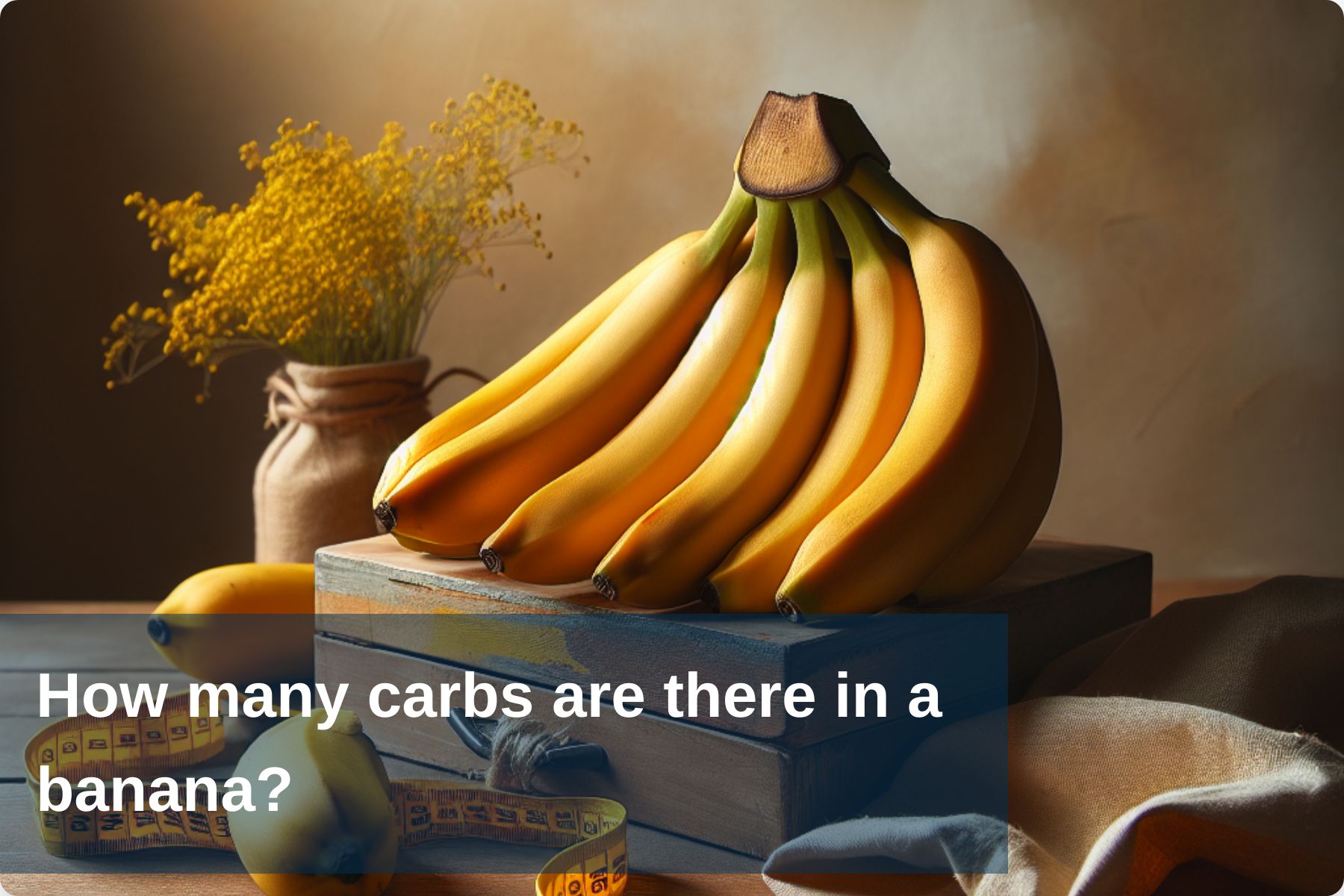
How many carbs are there in a banana?
Bananas, the simple and widely loved fruit, have a special spot in our daily diets. Known for their natural sweetness and convenience, bananas are not just a yummy snack but also a powerhouse of important nutrients.
People really like bananas for more than just their great taste. Full of important vitamins, minerals, and fiber, bananas add to a balanced and healthy diet. While we often hear about their potassium and how easy they are to carry around, it's important to talk about the carbs in this beloved fruit.
Carbs are a big part of what our bodies need for energy. Bananas, with their natural sugars like glucose, fructose, and sucrose, give us a quick and lasting energy boost. Knowing about the carbs in bananas helps us make smart food choices, especially if we're watching our sugar intake or looking for a healthy energy source.

Nutritional Overview of Bananas
Nutritional Value Chart of a medium sized banana(118g):
Nutrient |
Amount |
Calories |
105 |
Fat |
0.4g |
Sodium |
1.2mg |
Carbohydrates |
27g |
Fiber |
3.1g |
Sugars |
14.4g |
Protein |
1.3g |
Potassium |
422mg |
Vitamin C |
10.3mg |
Magnesium |
31.9mg |
Factors affcecting the carb content
-
Ripeness:
Unripe: Higher starch content, which converts to sugar (fructose, glucose, and sucrose) as the banana ripens.
Ripe: Higher sugar content due to the conversion of starch into simple sugars.
Size: Larger bananas generally have higher carbohydrate content than smaller ones, as they contain more flesh and therefore more sugars.
Type of Banana: Different varieties of bananas may have slightly different carbohydrate contents. For example, plantains tend to have higher starch and lower sugar content compared to dessert bananas.
Processing: Dried bananas (banana chips) have a much higher concentration of carbohydrates due to the removal of water content.
Cooking Method: Cooking bananas or using them in baked goods may concentrate the sugars further, increasing their glycemic load.
Individual Variability: Factors such as soil conditions, climate, and agricultural practices can affect the nutrient composition of bananas.
Storage and Handling: Storage conditions and ripening process can impact the sugar content as bananas continue to ripen after harvest.
Banana Delights at home
Dish |
Description |
|---|---|
Banana Bread |
Sweet bread made with mashed bananas, flour, sugar, eggs, and baking soda; often includes nuts or chocolate chips. |
Banana Smoothie |
Blended mixture of ripe bananas, milk (or yogurt), ice, and optionally, honey or other fruits for added flavor. |
Banana Pancakes |
Pancakes made with mashed bananas, eggs, flour (or almond flour for low-carb option), and baking powder; served with syrup or fruit. |
Banana Pudding |
A dessert made with layers of sliced bananas, vanilla pudding or custard, and usually topped with whipped cream or meringue. |
Grilled Banana |
Sliced bananas grilled or pan-fried until caramelized, often served as a side dish or dessert with ice cream or yogurt. |

Bananas: A nutritious powerhouse
On average, a medium-sized banana has about 27 grams of carbohydrates, but this can vary based on its size and ripeness. The size of the banana matters – smaller ones generally have fewer carbs, which is important for those watching their carb intake. Ripeness adds another factor to consider, affecting sugar levels and overall carb content. Choosing between less ripe and fully ripe bananas depends on your energy needs and blood sugar concerns.
Bananas, known for their natural sweetness and convenience, offer more than just taste. They are a nutrient powerhouse, providing essential vitamins, minerals, and dietary fiber. Their carb content, driven by natural sugars, makes them a valuable and quick energy source without the need for processed sugars.
Incorporating bananas into a balanced diet is an easy and effective way to meet nutritional needs. Whether as a snack, part of a meal, or a natural sweetener in recipes, bananas bring versatility and health benefits to the table. So, when you grab a banana next time, know that you're making a choice that not only pleases your taste buds but also contributes to your overall health and well-being.
FAQs
-
How many carbs are there in a medium-sized banana?
A medium-sized banana typically contains around 27 grams of carbs.
-
Are bananas a high-carb fruit?
Bananas are considered a high-carb fruit compared to others, but they also offer many nutrients beyond just carbs.
-
Do bananas have natural sugars that contribute to their carb content?
Yes, bananas contain natural sugars like fructose, which contribute to their carb count.
-
Are there different carb counts for various sizes of bananas?
Yes, the carb content of a banana can vary based on its size, but in general, they are a good source of carbohydrates.
-
How should individuals on low-carb diets incorporate bananas into their meal plans?
Those on low-carb diets may need to consume bananas in moderation due to their carb content, but they can still fit into a balanced eating plan.
This Blog post is an initiative by Lo! Foods, to provide accurate and Nutritionist / Doctor approved information related to Health. Lo! Foods is India's leading brand for Everyday Functional Foods. Foods designed for specific Health conditions or Needs. Lo! Foods also runs India's largest range of Low Carb Healthy Cloud Kitchens, under the brand names of Lo!, ProteinChef, ATH (All Things Healthy) and DiabeSmart.















Leave a comment
Your email address will not be published.